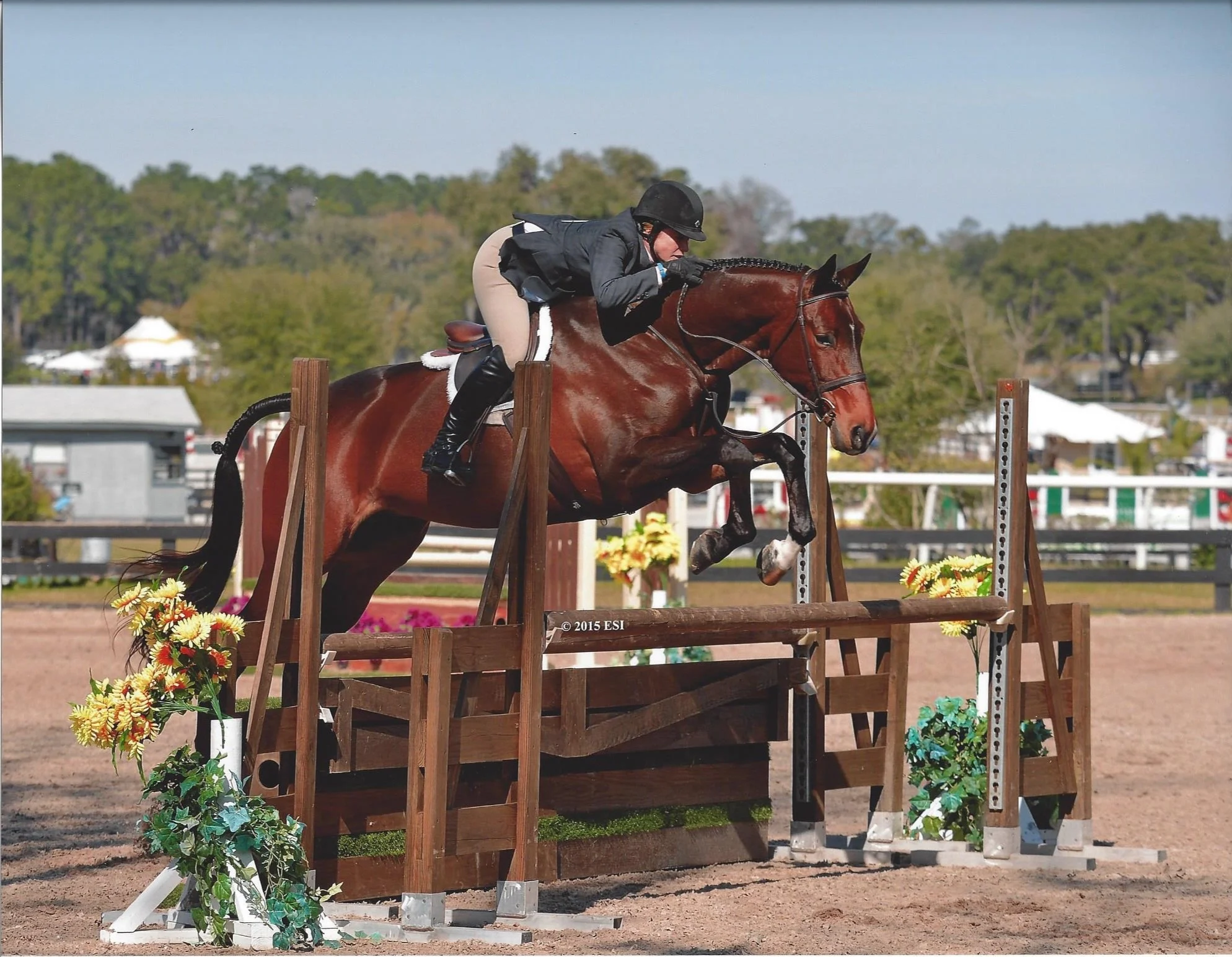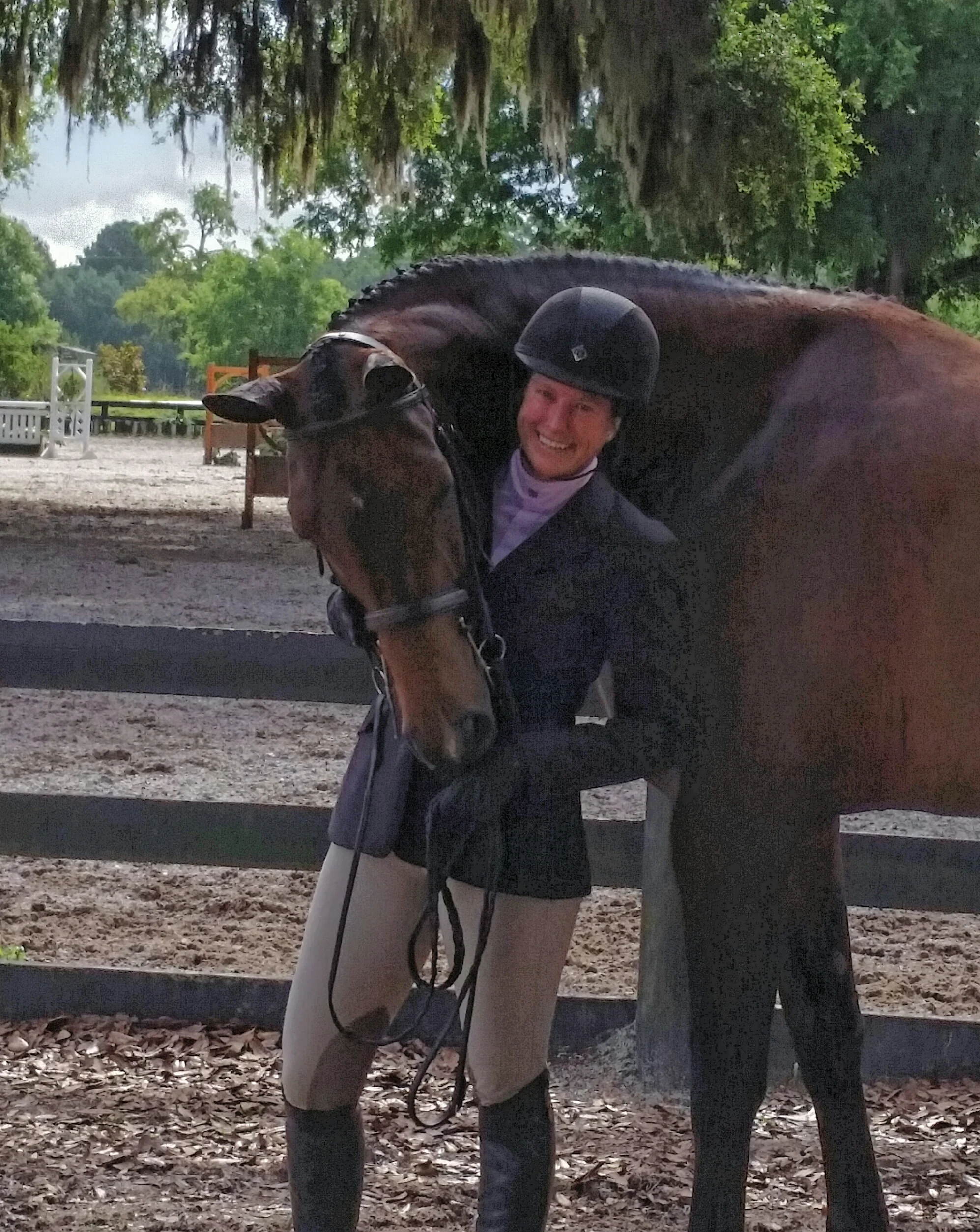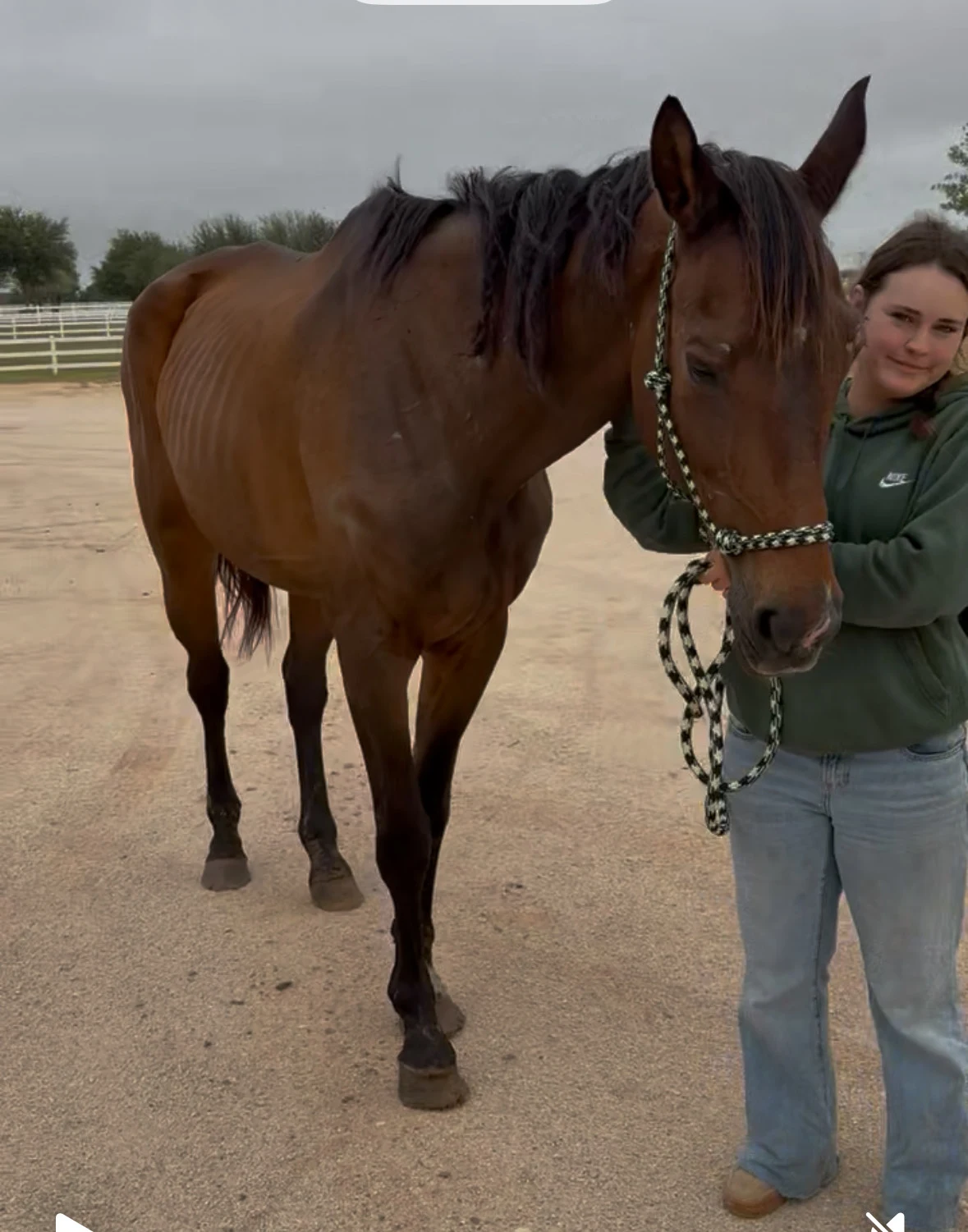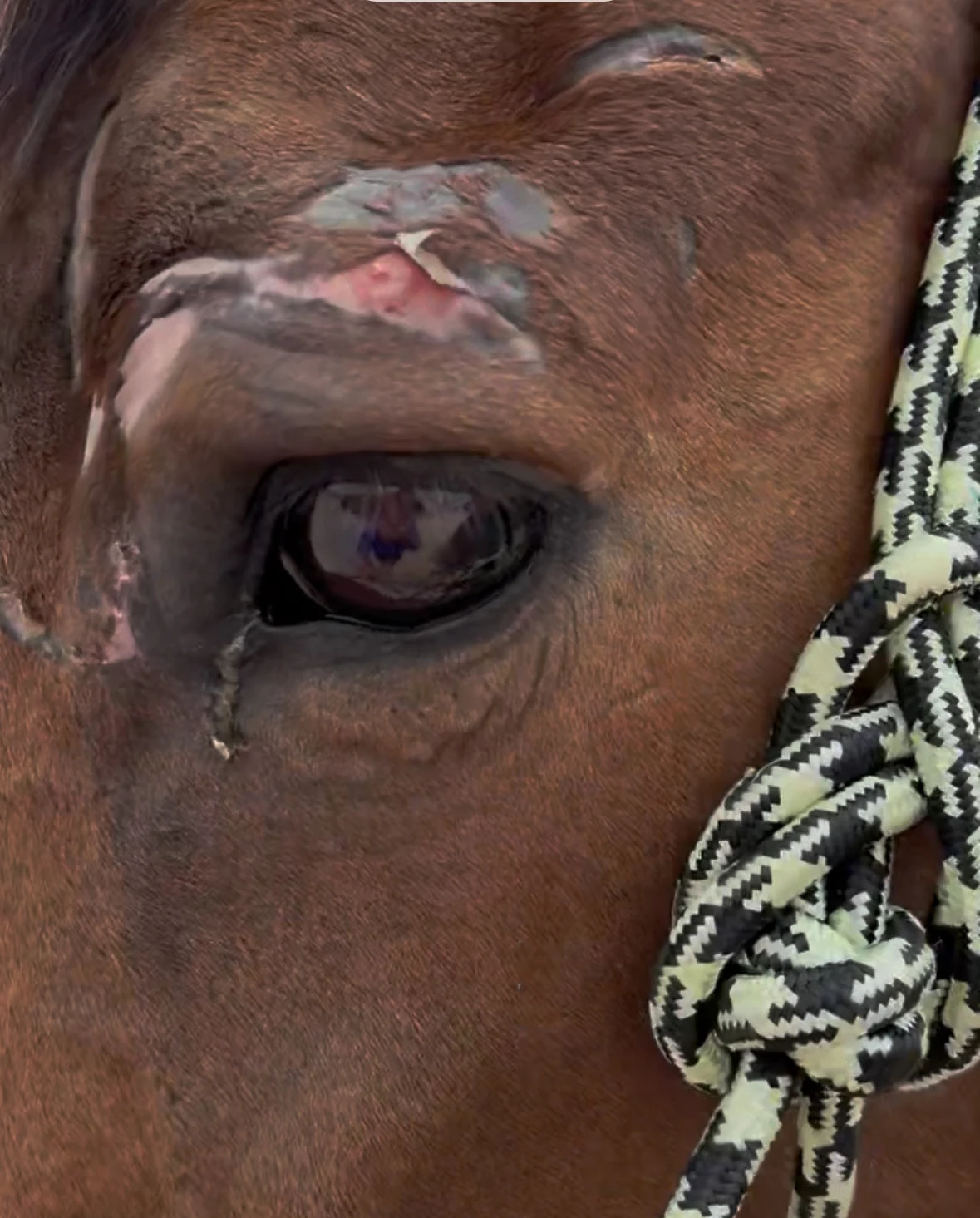Amateur hunter rider Anna Pavlov has a big heart, and she’d be the first to admit she is quick to respond whenever there is an animal in need. So when a friend shared a social media post with two photos—one showing an extremely thin, rough-looking bay mare, the other showing a screen shot of a U.S. Equestrian Federation horse registration including a name Pavlov recognized—she swung into action. The images were posted on the “Wish Upon a Horse” Facebook page, one of several similar pages set up to sell animals at risk of shipping to slaughter from livestock auctions in the Texas towns of McLean, Cleburne and Bowie. The Facebook page’s administrators had identified the horse in the photo as Cheers, a former champion hunter with a 42-page show record, thanks to her USEF-mandated microchip.
The mare’s condition was shocking enough, but what particularly caught Pavlov’s attention was the name and location of the breeder listed on Cheers’ USEF registration—Kaye Swinderman of Florida.
“I’ve been taking lessons with Robin [Swinderman Mitchell], and I thought, ‘There can’t be too many Swindermans,’ so I texted her,” Pavlov, of Morriston, Florida, said.
Robin, a professional trainer and USEF “R” hunter judge based near Ocala, Florida, was on a client’s horse when she received Pavlov’s text, but she recognized the mare immediately. As it turned out, Kaye is Robin’s mother, and Cheers (barn name “Flicka”) was one of their homebreds from 18 years earlier. Early in Flicka’s career, Robin herself had showed the mare through the 3’6” divisions. In 2016, Robin sold her to a junior, who was still the owner of record with USEF.

Once the connection was made, things began to happen rather quickly.
“Anna said, ‘The mare’s in trouble,’ ” Robin recalled. “She told me I needed to send $1,100 through Venmo, right now [to buy her]. I told Anna I would do it as soon as I finished riding, and she said if I didn’t do it right away, she was going to do it for me. So I ran back to the barn, and immediately wired some random person $1,100. I just put the horse’s name in the note, and thought, ‘I may have just lost $1,100.’ ”
But Robin was even more troubled by the question of how this once highly valuable, elite performance horse could have fallen on such hard times. Over the next days and weeks, as Flicka took her first steps toward recovery and Robin began to put the pieces of the puzzle together, she realized just how grateful she was that the horse had a microchip, and that someone had thought to scan for one.
From The Top … To The Bottom
By the multi-talented Trakehner stallion Hailo and out of the family’s Thoroughbred hunter Definate Presence, Flicka was the third in a line of full siblings bred by Kaye. The mare was started by jumper rider Bridget Nolan Howell and began competing in the pre-green division in 2012 under Shachine Belle. Robin took over the ride in 2013, showing Flicka throughout Florida for the next several years.
“This was one of the most talented horses my mother ever bred, and one of the last foal crops,” Robin said. “I think I was circuit champion on Flicka twice at HITS, once in the 3’3”, and once at 3’6”. She was a super easy, talented, quiet and brave mare.”
After the winter circuit concluded in 2016, Robin sold Flicka to a Texas-based junior, Emily Weimer, whose family paid “good money” for the gifted mare. Weimer trained with Colleen Acosta, a friend of Robin’s, and Robin felt good about the match. Weimer and Flicka enjoyed a successful career together, starting in the children’s divisions, then later the junior hunters. When it came time for college, Weimer enrolled at Baylor University in Waco, and in 2019, her family decided to donate Flicka to the school, which is home to a National Collegiate Equestrian Association team.
ADVERTISEMENT

Baylor Equestrian Head Coach Casie Maxwell confirmed via email that “Cheers” was officially retired from their program in September 2023 and placed with a new owner who she did not name.
“Although she has not been in our possession for almost two years, it was distressing to hear of her difficult circumstance, and we are grateful to the original breeder who learned about her situation through a microchip, and for her efforts to save her,” Maxwell said in an emailed statement on behalf of Baylor Equestrian.
Robin doesn’t blame the school for anything that happened to Flicka once she was no longer in their care, and noted that Maxwell reached out immediately when she heard the news.
“It sounds like Flicka was in a good place at first,” Robin said. “But it’s also not a school’s responsibility to retire horses. They try to do the best they can—we all try to do the best we can, and keep track of these horses—but even when you’re trying, things don’t always go the way you think they will.”
Robin is still heartbroken that her treasured homebred somehow ended up skinny and neglected at a livestock auction. But she thinks it is critical for sport horse enthusiasts to understand that even elite horses can end up in bad situations, and if their former connections find out, they should be prepared to step up and help.
“I know what it costs to keep one, and I understand retiring horses is expensive,” Robin said. “But I do think people should know these things can happen, and we have an obligation to these horses. People need to take a little responsibility.”
Thanks To A Microchip
Robin and Pavlov still don’t know how Flicka ended up at an auction, or even which Texas auction lot had her. Pavlov, who has attended and purchased animals from several of the sales, says horses sold there run the gamut from decent riding horses to those for whom euthanasia would be a more humane option. Because some horses at these auctions do ship to slaughter, social media has helped spawn a cottage industry of Facebook groups that claim to pull horses from these auctions’ “kill pens,” then advertise them for “bail” or “adoption” before they are sent to slaughter. Despite sometimes calling themselves rescues, many such pages are actually affiliated with dealers.
“They buy horses cheap, and sell them to people on Facebook that feel bad for them,” Pavlov said. “It’s not a scam, as in, you won’t get a horse. But it’s a horse dealer, selling horses in a manipulative way on Facebook.”
“They scan them all for microchips,” she added, “which is the only thing that saved her—because if she hadn’t been microchipped, I feel it’s really unlikely someone would have bought her.”
Perhaps because Flicka was so skinny, people at the sales lot mistook her for a Thoroughbred. It was only when the chip number didn’t come up on Equibase that someone thought to search the USEF database instead. As soon as Flicka’s USEF information was identified, Wish Upon A Horse posted it, along with a picture of the mare, to social media. That post was shared widely on social media, ultimately connecting the mare to her original owners.
“I’m not special—someone would have put the pieces together,” Pavlov said. “That’s the beauty of social media, and connecting the horse world. We’re all a degree away from each other, and I don’t forget a name.”
ADVERTISEMENT
Despite Robin’s concern that she might be sending her money into a black hole, her payment did, in fact reach, Wish Upon a Horse, making her once again Flicka’s official owner. But now Robin had a new problem: Flicka was in a tiny town called McLean, population 648, located in the Texas Panhandle close to the Oklahoma border, and was clearly in no condition to travel far. From 1,300 miles away, Robin had to get her mare help—and fast. Once again, it was social media to the rescue.
“I can tell this place is a pen, she’s really skinny, she’s got a banged-up eye, and her feet are tragic,” Robin said. “I knew she needed to be quarantined, to be sure she wasn’t sick. I didn’t know what kind of horses she’d been in contact with, or when she was last vaccinated. I asked for friends’ help, to find out if I knew anybody near McLean, Texas.”
Robin was not prepared for the response she received—from friends, acquaintances and even strangers—all offering assistance.
“Most people were close to Dallas, which was pretty far away, and I didn’t think I should ship her that far in the state she was in,” she said, “but apparently there’s not much in McLean, Texas.”
Then Robin received a phone call from trainer Jennifer Koval, who operates her Baybridge LLC out of Midland, Texas. Koval’s sister thought she had ridden Flicka when she was at Baylor, and they wanted to help. Robin learned she shared several connections with Koval, who all said positive things about her.
“I didn’t know her, but I had a really good feeling about her,” Robin said. “I told her, ‘I need to get Flicka out of there, now.’ And she said, ‘No problem.’ ”
Flicka’s Final Home
Koval’s farm was still a nearly five-hour haul from McLean, but once the mare arrived, her team went to work on restoring her health. Flicka had a veterinary and farrier evaluation, a bath, was started on a refeeding program, and was showered with love. Although her appetite and overall attitude were good, her feet were not. Worried that she may have previously foundered, the farrier cast her front feet in supportive shoes to make her more comfortable. Koval sent Robin updates almost daily, and the mare seemed to be making good progress.


Robin was prepared to retire Flicka on her Florida farm, once the mare was healthy enough to make the 20-hour trip. But as feedback came in regarding the condition of Flicka’s feet, Robin’s concerns about her long-term comfort grew. And then on June 20—roughly two and a half weeks after she had arrived at Koval’s farm—Flicka spiked a fever. Koval’s team immediately took her to a nearby clinic, where she was diagnosed with pneumonia, and X-rays confirmed severe rotation in her right front foot. With a poor prognosis for recovery given her already weakened condition, her newfound family made the heartbreaking but humane decision to euthanize Flicka the next morning.
Despite the final outcome being not what anyone had hoped, Robin is grateful that Flicka enjoyed several weeks of love and care and received a peaceful ending. Further, she acknowledges the critical roles that both Flicka’s microchip and social media played in getting the mare the help she desperately needed, and providing Robin with closure.
“The microchip certainly saved that mare’s life,” Robin said. “Absolutely. I grew up in this industry, buying and selling horses, a lot of us do, so I can afford to buy the next one and move on. But I worry about a lot of the horses I’ve sold.
“I try to keep track, but I confess there are horses I just have no idea where they ended up, and I have to hope that somebody is taking care of them,” she continued. “This one got unlucky, but then was lucky that I was able to find her again. Without that … I wouldn’t have closure about what happened to her.”














